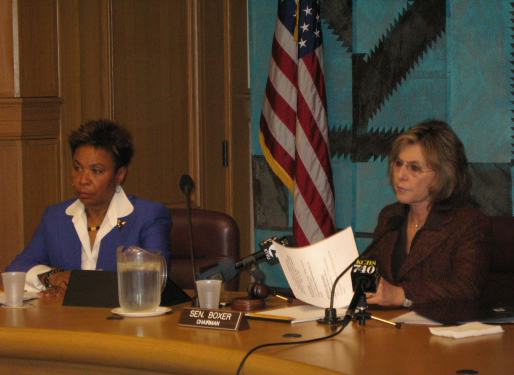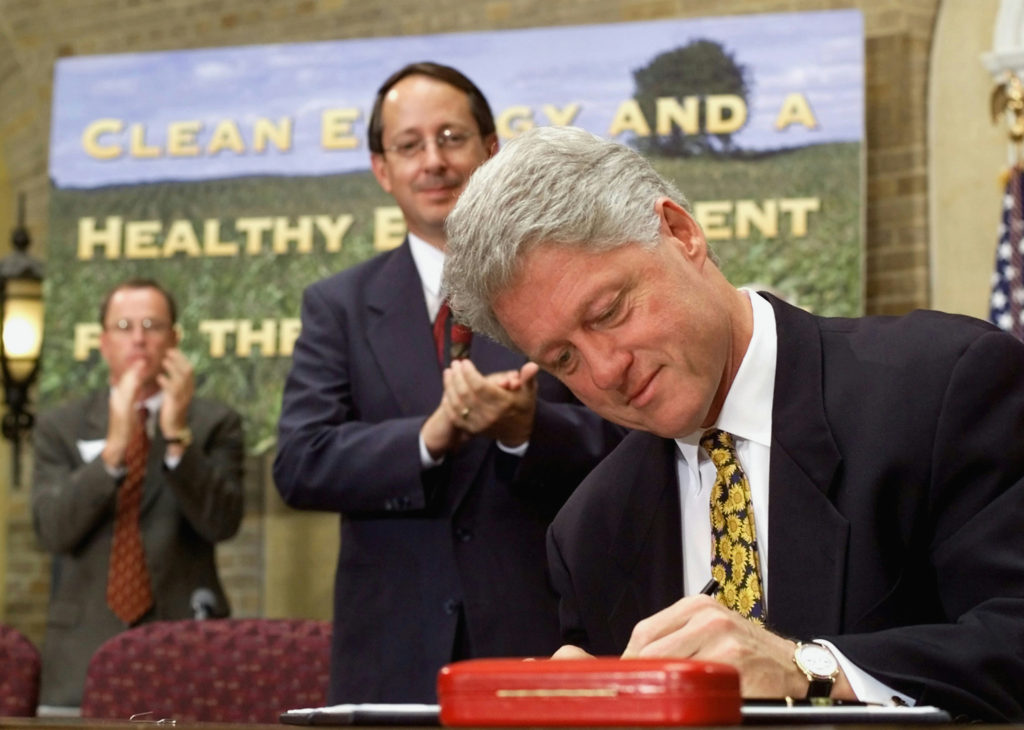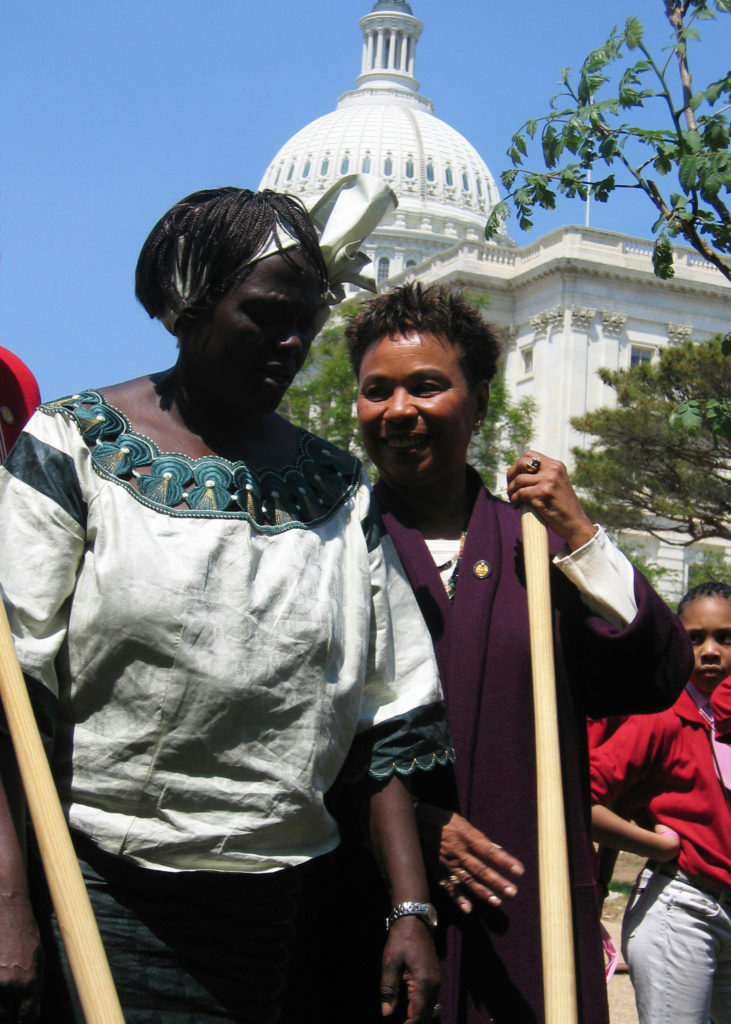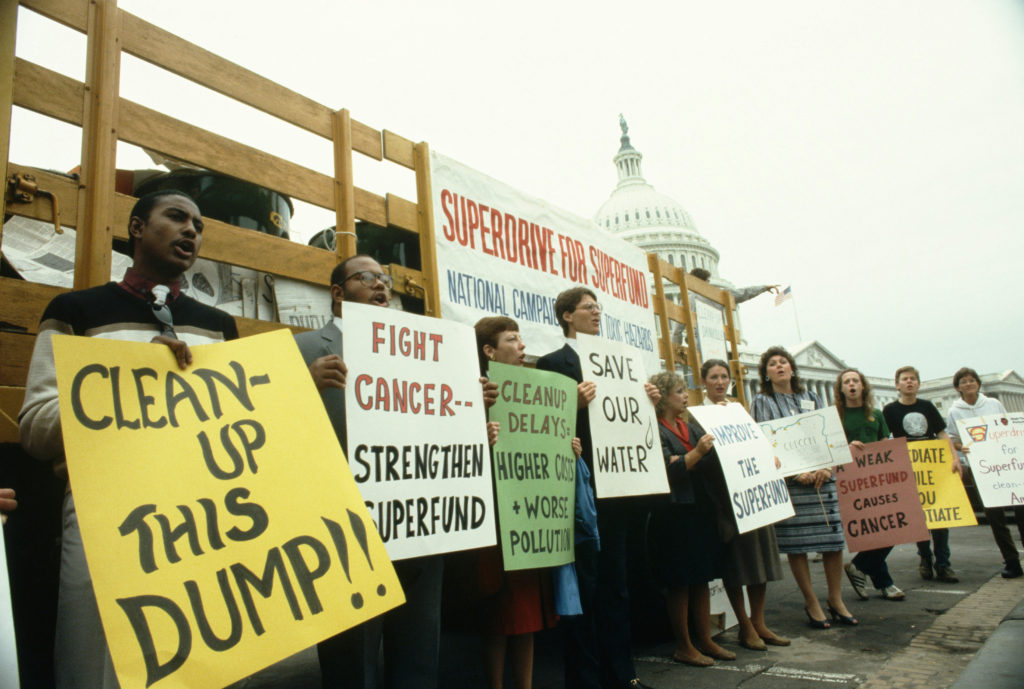Environmental Justice: Legislation
Discover how members of the CBC have led the way in championing the Environmental Justice movement.

Rep. Barbara Lee and Sen. Barbara Boxer
Rep. Barbara Lee participates in Senate Environment and Public Works field hearing with Sen. Boxer on Environmental Justice and Toxic Waste Issues in Northern California.
Environmental justice is at the forefront of the Congressional Black Caucus’ agenda. With some of the strongest voting records on the environment, CBC members have demonstrated their commitment to environmental justice through their support of legislation designed to enhance the government’s ability to ensure the environmental health and safety of all citizens. CBC members have proposed specific legislation aimed at promoting and enhancing existing policy related to environmental concerns. For example, during the 105th and 106th Congresses, CBC members, led by Rep. John Lewis (D-GA), proposed legislation to promote environmental justice, public health, and pollution reduction efforts. During the 109th Congress, Rep. Alcee L. Hastings (D-FL), with the support of more than twenty other CBC members, fought to ensure that Executive Order 12898, Federal Actions to Address Environmental Justice in Minority and Low-Income Populations, remained in force until changed by law. They also worked to expand the definition of environmental justice and to direct each federal agency to establish an Environmental Justice Office. More recently, Rep. Jesse L. Jackson Jr. (D-IL) proposed an amendment to the Constitution of the United States respecting the right to a clean, safe, and sustainable environment.
Long before the terms environmental justice and environmental racism appeared in the 1980s, CBC members were actively engaged in the promotion of environmental safety in their communities. In the 1970s, for example, CBC members fought hard to ensure that citizens were empowered to take action against entities involved in creating environmental hazards in their communities. They also supported the creation of environmental policy regulations and oversight agencies. During the 93rd Congress, for example, CBC founders Reps. Parren J. Mitchell (D-MD), Charles B. Rangel (D-NY), and Louis Stokes (D-OH) co-sponsored several bills aimed at creating a Committee on the Environment in Congress. That same year, Reps. Shirley A. Chisholm (D-NY), Ralph H. Metcalf (D-IL), Ronald V. Dellums (D-CA) and Del. Walter E. Fauntroy (D-DC) supported a bill to amend the National Environmental Policy Act of 1969. This legislation sought to empower citizens to be able to take legal action against entities involved in creating environmental hazards. Rep. Dellums also proposed legislation to protect marine and wildlife ecology by providing for the orderly regulation of dumping in the ocean, coastal, and other waters. During the 94th Congress, Rep. John Conyers Jr. (D-MI) proposed legislation to protect individuals against conduct which created potential health hazards.
Throughout the Caucus’ history, CBC members have proposed and supported legislation advocating for clean air and water, as well as the safe transportation and removal of toxic and hazardous materials. During the 103rd Congress, for example, Rep. Edolphus Towns (D-NY) sought to establish certain requirements with respect to solid waste and hazardous waste incinerators. During the 106th Congress, CBC members co-sponsored amendments to the Clean Air Act. During the 107th Congress, Rep. Sheila Jackson Lee (D-TX) proposed amendments to the Safe Drinking Water Act to provide for research on methods to combat biological contamination of public drinking water supplies.
In the 110th Congress, CBC members continued to advance the cause of environmental justice. For example, Rep. Hastings proposed legislation to direct each federal agency to establish an Environmental Justice Office. Reps. Danny K. Davis (D-IL) and Barbara Lee (D-CA) co-sponsored legislation to ensure that federal agencies take actions to assess and improve the health impacts and environmental quality of communities they serve. Del. Eleanor Holmes Norton (D-DC) proposed an amendment to the Safe Drinking Water Act to ensure that the District of Columbia and all states are provided a safe, lead-free supply of drinking water. Other members such as Rep. G.K. Butterfield (D-NC) supported legislation to protect national waterways and their tributaries.
In 2007, Rep. Yvette D. Clarke (D-NY) sponsored legislation to enhance environmental justice education in middle and high schools that serve disadvantaged students. Reps. Hastings and Albert R. Wynn (D-MD) co-sponsored legislation to establish an Interagency Working Group on Environmental Justice to provide guidance to federal agencies. Rep. Lee also introduced legislation that called for the evaluation of federal rules and regulations which could have harmful effects on public health, air and water quality, global climate, plant and wildlife and the environment.
Throughout the 2010s, CBC members continued their legislative focus on environmental justice. Many, including Reps. Brenda Lawrence (D-MI), James Clyburn (D-SC), Bobby Rush (D-IL), Bonnie Watson Coleman (D-NJ), Bennie Thompson (D-MI), and Del. Eleanor Holmes Norton (D-DC), introduced bills to address water safety and infrastructure issues brought to light by the Flint, Michigan water crisis. Others like Reps. Donald McEachin (D-VA), Eddie Bernice Johnson (D-TX), and Sheila Jackson Lee (D-TX) continued the work of early CBC members to improve environmental quality standards and pass laws to remediate pollution in historically underserved communities. In the Senate, Sen. Cory Booker (D-NJ) sponsored a series of bills to strengthen protections for low-income and minority communities disproportionately impacted by pollution.
In 2020, the CBC unveiled the second edition of the Jobs and Justice Act. First introduced in 2018 by then-CBC Chair Cedric Richmond, the omnibus bill included over 200 pieces of legislation championed by CBC members to address a wide range of issues impacting Black Americans. The bill addressed inequities in environmental health, infrastructure, and climate resilience in historically underserved communities alongside broad social and economic reforms, underscoring the need to include the environment in a holistic approach to justice and equity for underserved communities. Other recent CBC member-led legislative efforts to address environmental justice issues include the Environmental Justice Act of 2021 sponsored by Sen. Cory Booker (D-NJ) and the Environmental Justice for All Act introduced in 2021 by CBC member Rep. Donald McEachin (D-VA) and Rep. Raul M. Grijalva (D-AZ). Rep. Bennie G. Thompson (D-MS) also introduced the Federal Emergency Management Advancement of Equity Act (or FEMA Equity Act) in 2022 to address systemic inequities in the Federal government’s response to disasters.
Today, the environment remains a central legislative issue for the CBC. Members continue to introduce legislation to address a wide range of environmental issues.



